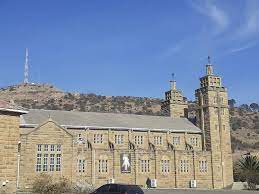… Catholic Church rocked by religious uprising over same-sex unions”
Relebohile Makhetha
In a scandal rocking the foundations of faith, the Roman Catholic Church (RCC) finds itself entangled in a fierce battle between religious doctrine and the push for progressive values.
The Christian Advocates and Ambassadors Association, acting as the self-proclaimed guardians of morality, fired the first salvo by sending a blistering letter to the Lesotho RCC this week.
The letter, described as “distasteful” by human rights activist Advocate Lepeli Moeketsi, was a vehement response to a revelation – Pope Francis’s ruling, codenamed “Fiducia Supplicans”.
This decree, as detailed by advocate Fusi Sehapi, a lightning rod for controversy, purportedly allowed Roman Catholic priests to bless same-sex unions, a revelation that has sent shockwaves through the conservative corridors of the church.
Sehapi, acting on the Association’s mandate, laid out a litany of charges against the act, referencing the Christian Constitution and Lesotho’s Marriage Act to fortify his argument. He claimed that the act of blessing same-sex unions amounted to heresy, immorality, and blasphemy – offenses he argued were not just unbiblical but also criminalised under Lesotho’s Penal Code Act.
“According to the Christians Constitution which is their Bible, same sex marriage is prohibited as ‘Marriage’ is the exclusive union of male and female. The Bible also prohibits homosexuality,” he wrote.
“Additionally, same sex union/marriages is also outlawed by the Marriage Act No. 10 of 1974 which contemplates that ‘Marriage’ union shall be exclusively between male and female gender,” he added.
“Making a proclamation that same sex is blessed is seditious, immoral and blasphemous all of which are unbiblical and criminalised in Section 105(a) of the Penal Code Act, 2010.
“Blessing same sex unions or marriages by any Roman Catholic Priest and/or any Minister of Religion is heresy and constitutes a moral, civil and criminal wrong. God cannot bless sin through the instrumentality of Priests.”
Advocate Moeketsi, known for his bold stance on human rights and unafraid to challenge religious dogma, lambasted the letter, condemning it as an attempt to limit the rights and freedoms of the LGBTI community under the guise of ‘Christian values.’
The battle lines were drawn, and the clash of ideals escalated into a full-blown war of words.
“As a human rights defender who does not hold religious views with high esteem, I find this piece of letter distasteful in so far as it unjustly and unreasonably limit other peoples’ rights and freedoms under the disguise of the so-called Christian values”, he said
“Otherwise, those aggrieved ‘Christian Ambassadors’ are within their right to exercise their freedom of opinion by voicing out their views on any subject matter of interest to them, like they are doing in this letter. However, they have no right to curtail rights and freedoms of other groups within our society on the basis of their beliefs,” he added.
In the midst of this fervour, the People’s Matrix Association, the standard-bearers of LGBTI rights in Lesotho, chose a strategic silence, leaving the public to speculate about their next move in this high-stakes clash between tradition and progress.
Lesotho Catholic Bishops’ Conference (LCBC) earlier this month made a statement attempting to douse the flames by clarifying that ‘Fiducia Supplicans’ did not alter the church’s stance on marriage. LCBC asserted that marriage remained an exclusive union between a man and a woman, dismissing any notion that the Church could bless same-sex unions.
“The blessing of marriage is reserved to the ordained Minister. The blessing of the ordained Minister is tied directly to the specific union of a man and a woman, who establish an exclusive and indissoluble covenant by their consent,” it said.
“The church has no power to impart blessings on unions of persons of the same sex. The church does not have the power to confer its liturgical blessing when that would somehow offer a form of moral legitimacy to union that presumes to be marriage or to an extra-marital sexual practice,” it added.
“The church does not invent the truth, but imparts it when requested to do so. The church is thus the Sacrament of God’s infinite love.”
LCBC further explained that Fiducia Supplicans was a declaration or clarification, not a new teaching or doctrine on marriages as Sacrament which deserved a proper Liturgical Blessing.
“The Church has many kinds of other blessings which should not be confused or even resemble the Sacrament of Marriage. Pastoral Prudence must be exercised when imparting blessings either to individuals or groups not sexual unions outside marriage (extra-marital0, like divorced, divorcees, excommunicated for whatever reason, cohabitation, polygamy, including same sex unions,” it said.
“The document follows a logical, consistent, and coherent reasoning. It follows a clear syllogistically reasoning of the Major Premise, Minor Premise, and Conclusion,” it added.
Summary
- Advocate Moeketsi, known for his bold stance on human rights and unafraid to challenge religious dogma, lambasted the letter, condemning it as an attempt to limit the rights and freedoms of the LGBTI community under the guise of ‘Christian values.
- “As a human rights defender who does not hold religious views with high esteem, I find this piece of letter distasteful in so far as it unjustly and unreasonably limit other peoples’ rights and freedoms under the disguise of the so-called Christian values”, he said.
- The blessing of the ordained Minister is tied directly to the specific union of a man and a woman, who establish an exclusive and indissoluble covenant by their consent,” it said.

Your Trusted Source for News and Insights in Lesotho!
At Newsday Media, we are passionate about delivering accurate, timely, and engaging news and multimedia content to our diverse audience. Founded with the vision of revolutionizing the media landscape in Lesotho, we have grown into a leading hybrid media company that blends traditional journalism with innovative digital platforms.








